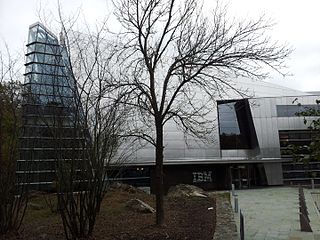Related Research Articles

Nvidia Corporation, more commonly referred to as Nvidia, is an American technology company incorporated in Delaware and based in Santa Clara, California. It designs graphics processing units (GPUs) for the gaming and professional markets, as well as system on a chip units (SoCs) for the mobile computing and automotive market. Its primary GPU product line, labeled "GeForce", is in direct competition with Advanced Micro Devices' (AMD) "Radeon" products. Nvidia expanded its presence in the gaming industry with its handheld Shield Portable, Shield Tablet, and Shield Android TV.

A chatbot is a piece of software that conducts a conversation via auditory or textual methods. Such programs are often designed to convincingly simulate how a human would behave as a conversational partner, although as of 2019, they are far short of being able to pass the Turing test. Chatbots are typically used in dialog systems for various practical purposes including customer service or information acquisition. Some chatbots use sophisticated natural language processing systems, but many simpler ones scan for keywords within the input, then pull a reply with the most matching keywords, or the most similar wording pattern, from a database.

A multi-agent system is a computerized system composed of multiple interacting intelligent agents. Multi-agent systems can solve problems that are difficult or impossible for an individual agent or a monolithic system to solve. Intelligence may include methodic, functional, procedural approaches, algorithmic search or reinforcement learning.
The ethics of artificial intelligence is the part of the ethics of technology specific to robots and other artificially intelligent beings. It can be divided into roboethics, a concern with the moral behavior of humans as they design, construct, use and treat artificially intelligent beings, and machine ethics, which is concerned with the moral behavior of artificial moral agents (AMAs).
Translators without Borders is a non-profit organization set up to provide translation services for humanitarian non-profits. It was established in 2010 as a sister organization of Traducteurs Sans Frontières, founded in 1993 by Lori Thicke and Ros Smith-Thomas of Lexcelera. As of 2012 it had about 1600 vetted volunteer translators. Translators without Borders aims to close the language gaps that hinder critical humanitarian efforts by connecting non-profit humanitarian organizations with a volunteer community of professional translators, building language translation capacity at the local level and raising awareness globally about language barriers.
Artificial intelligence, defined as intelligence exhibited by machines, has many applications in today's society. More specifically, it is Weak AI, the form of AI where programs are developed to perform specific tasks, that is being utilized for a wide range of activities including medical diagnosis, electronic trading platforms, robot control, and remote sensing. AI has been used to develop and advance numerous fields and industries, including finance, healthcare, education, transportation, and more.
Ushahidi is an open source software application, and a non-profit technology company with staff in nine countries whose mission is to help marginalized people raise their voice and those who serve them to listen and respond better. It has been instrumental in creating the Kenyan tech ecosystem, known as the Silicon Savannah, and its employees have gone on to found iHub, Akirachix, and BRCK.
An intelligent virtual assistant (IVA) or intelligent personal assistant (IPA) is a software agent that can perform tasks or services for an individual based on commands or questions. Sometimes the term "chatbot" is used to refer to virtual assistants generally or specifically accessed by online chat. In some cases, online chat programs are exclusively for entertainment purposes. Some virtual assistants are able to interpret human speech and respond via synthesized voices. Users can ask their assistants questions, control home automation devices and media playback via voice, and manage other basic tasks such as email, to-do lists, and calendars with verbal (spoken?) commands. A similar concept, however with differences, lays under the dialogue systems.

Watson is a question-answering computer system capable of answering questions posed in natural language, developed in IBM's DeepQA project by a research team led by principal investigator David Ferrucci. Watson was named after IBM's founder and first CEO, industrialist Thomas J. Watson.

Linaro is an engineering organization that works on free and open-source software such as the Linux kernel, the GNU Compiler Collection (GCC), power management, graphics and multimedia interfaces for the Arm family of instruction sets and implementations thereof as well as for the Heterogeneous System Architecture (HSA). The company provides a collaborative engineering forum for companies to share engineering resource and funding to solve common problems on Arm software.
The Qatar Computing Research Institute (QCRI) in Doha, Qatar, is a nonprofit multidisciplinary computing research institute founded by the Qatar Foundation (QF) for Education, Science and Community Development in 2010. It is primarily funded by the Qatar Foundation, a private, non-profit organization that is supporting Qatar on its journey from carbon economy to knowledge economy.
Dr Ahmed K. Elmagarmid is a computer scientist, academic and executive. He is the founding Executive Director of Qatar Computing Research Institute, a national research institute under Hamad bin Khalifa University, a member of the Qatar Foundation for Education, Science and Community Development. Since his appointment in 2010, Elmagarmid has focused on large-scale computing challenges that address national priorities for growth and development of Qatar. The computer research community, especially the database research recognizes the important role he has played at international level by creating data-centric research institution like QCRI and building it into an internationally reputed research institute.

The International Business Machines Corporation (IBM) is an American multinational technology company headquartered in Armonk, New York, with operations in over 170 countries. The company began in 1911, founded in Endicott, New York, as the Computing-Tabulating-Recording Company (CTR) and was renamed "International Business Machines" in 1924. IBM is incorporated in New York.
Cognitive computing (CC) describes technology platforms that, broadly speaking, are based on the scientific disciplines of artificial intelligence and signal processing. These platforms encompass machine learning, reasoning, natural language processing, speech recognition and vision, human–computer interaction, dialog and narrative generation, among other technologies.
Sahana Software Foundation is a Los Angeles, California-based non-profit organization founded to promote the use of free and open-source software (FOSS) for disaster and emergency management. The foundation's mission statement is to "save lives by providing information management solutions that enable organizations and communities to better prepare for and respond to disasters." The foundation's Sahana family of software products include Eden, designed for humanitarian needs management; Vesuvius, focused on the disaster preparedness needs of the medical community; and legacy earlier versions of Sahana software including Krakatoa, descended from the original Sahana code base developed following the 2004 Indian Ocean tsunami. The word "Sahana" means "relief" in Sinhalese, the national language of Sri Lanka.

Stellar is an open source, decentralized protocol for digital currency to fiat money transfers which allows cross-border transactions between any pair of currencies. The Stellar protocol is supported by a 501(c)3 nonprofit, the Stellar Development Foundation.
Kinetica DB, Inc. is a company that develops a distributed, memory-first database management system using graphics processing units (GPUs) called the Kinetica Active Analytics Platform. The company has headquarters in Arlington, Virginia and San Francisco and regional offices in Europe and Asia Pacific.
Crowdmapping is a subtype of crowdsourcing by which aggregation of crowd-generated inputs such as captured communications and social media feeds are combined with geographic data to create a digital map that is as up-to-date as possible on events such as wars, humanitarian crises, crime, elections, or natural disasters. Such maps are typically created collaboratively by people coming together over the Internet.

Joy Adowaa Buolamwini is a Ghanaian-American computer scientist and digital activist based at the MIT Media Lab. She founded the Algorithmic Justice League, an organisation that looks to challenge bias in decision making software.
References
- ↑ "AIDR (Artificial Intelligence for Digital Response) — Social Tech Guide". Social Tech Guide. Retrieved 6 January 2017.
- 1 2 "20 Innovation Showcases winners to exhibit projects at WISH summit". Gulf Times. 30 October 2016. Retrieved 6 January 2017.
- ↑ "Artificial Intelligence for Digital Response by Muhammad Imran - Research Project on ResearchGate" . Retrieved 7 January 2017.Cite journal requires
|journal=(help) - ↑ "Open Source Software Challenge Winner!". Text on Techs. Retrieved 6 January 2017.
- ↑ "QCRI's AIDR (Artificial Intelligence for Disaster Response), has been awarded the Grand Prize for the 2015 Open Source Software System Challenge" . Retrieved 7 January 2017.
- ↑ "10th OSS World Challenge 2016". ossaward.org. Archived from the original on 7 January 2017. Retrieved 7 January 2017.
- 1 2 Meier, Patrick. Digital Humanitarians: How Big Data Is Changing the Face of Humanitarian Response.
- ↑ "QCRI technology goes global in tackling health issues". Gulf Times. 16 December 2016. Retrieved 6 January 2017.
- ↑ "AI helps answer thousands of health queries in Zambia via SMS". New Scientist. 4 April 2016. Retrieved 7 June 2017.
- ↑ Collins, Katie. "How AI, Twitter and digital volunteers are transforming humanitarian disaster response". WIRED UK. Retrieved 7 January 2017.
- ↑ "The Role of Social Media and Artificial Intelligence for Disaster Response". SlideShare. Retrieved 7 June 2017.
- ↑ "IBM Watson scientist visits Qatar to present platform that 'thinks like a human'". QCRI. Retrieved 7 January 2017.